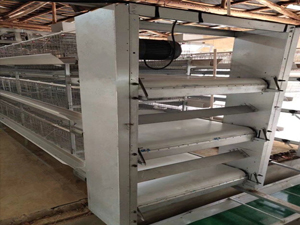Introduction to Modern Poultry Farming
In the evolving landscape of poultry farming, efficiency and sustainability have become the cornerstones of success. As the industry faces increasing pressure to optimize operations and reduce environmental impact, innovative solutions are emerging to meet these challenges. One such advancement is the introduction of manure belt systems, specifically designed to improve waste management and overall farm productivity. These systems, when integrated with poultry manure conveyors, offer a streamlined approach to handling one of the most significant byproducts of poultry farming—manure.
The Role of Manure Belt Systems in Poultry Farming
The manure belt system is a revolutionary development in the poultry industry, designed to efficiently collect and transport manure away from the housing environment. Traditionally, manure management has been a labor-intensive and time-consuming process, often leading to hygiene concerns and operational inefficiencies. However, with the advent of these advanced systems, farmers can now automate the collection and removal of manure, thereby significantly reducing manual labor and improving the overall sanitation of the poultry house.
How Poultry Manure Conveyors Enhance Efficiency
A critical component of these modern manure management systems is the poultry manure conveyor. These conveyors work in tandem with the manure belt to transport waste to a designated disposal area. The integration of these two systems ensures that manure is removed from the poultry house in a timely and efficient manner, minimizing the accumulation of waste and reducing the risk of contamination. By automating this process, farmers can focus on other essential aspects of farm management, ultimately leading to higher productivity and better animal health.
Benefits of Using Manure Belt Systems in Poultry Farms
The adoption of manure belt systems offers several key benefits to poultry farmers. Firstly, these systems help maintain a cleaner environment within the poultry house, which is crucial for the health and well-being of the birds. A cleaner environment reduces the risk of disease outbreaks, leading to healthier flocks and higher production rates. Secondly, the efficient removal of manure helps in controlling ammonia levels, which can be harmful to both birds and farm workers if not properly managed.
Moreover, the use of a poultry manure conveyor system can lead to significant cost savings over time. By automating manure management, farmers can reduce labor costs and minimize the need for manual intervention. Additionally, the timely removal of manure reduces the wear and tear on housing equipment, thereby extending its lifespan and reducing maintenance costs.
Environmental Impact and Sustainability
In addition to the operational benefits, manure belt systems also contribute to environmental sustainability. The efficient handling and disposal of manure help in reducing the environmental footprint of poultry farming. By collecting manure in a controlled manner, these systems facilitate the recycling of waste into valuable byproducts such as organic fertilizers. This not only reduces the need for chemical fertilizers but also promotes sustainable farming practices.
Furthermore, the reduction in ammonia emissions and improved air quality within the poultry house contribute to a healthier environment for both animals and farm workers. The ability to manage waste more effectively also helps in meeting regulatory requirements related to environmental protection, ensuring that poultry farms remain compliant with local and international standards.
Technological Advancements in Manure Belt Systems
The development of manure belt systems has been driven by advancements in technology and engineering. Modern systems are designed with durability and efficiency in mind, utilizing high-quality materials that can withstand the harsh conditions of a poultry farm. Additionally, these systems are equipped with sensors and automated controls that allow for real-time monitoring and adjustments, ensuring optimal performance at all times.
The integration of poultry manure conveyors with advanced manure belt systems represents a significant leap forward in farm automation. These systems are not only more efficient but also more user-friendly, requiring minimal training for farm workers. The ability to customize these systems to meet the specific needs of a farm further enhances their value, making them an indispensable tool for modern poultry farming.
The Future of Poultry Farming with Manure Belt Systems
As the poultry industry continues to evolve, the importance of efficient waste management cannot be overstated. The adoption of manure belt systems, coupled with poultry manure conveyors, is set to become the standard in poultry farming, offering a practical solution to the challenges of waste management. These systems not only improve farm efficiency but also contribute to the sustainability of the industry, ensuring that poultry farming can continue to thrive in the face of growing environmental concerns.
Conclusion
The integration of advanced manure management systems is a testament to the ongoing innovation within the poultry industry. By embracing these technologies, farmers can enhance their operations, reduce their environmental impact, and ensure the long-term success of their farms. To explore more about these innovative solutions, visit plasticssheets.com for detailed information and product offerings.


